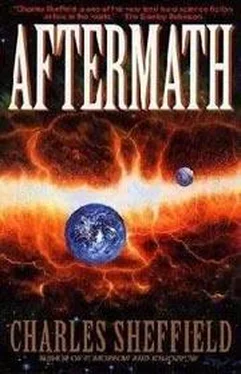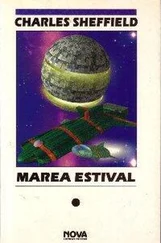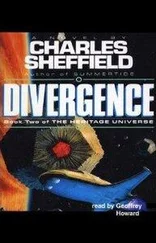Should he just keep on driving, as long as he could? The tractor had no lights. But if he stopped, where would he sleep? He could drive off the road and stretch out by the tractor, but it was getting chilly and the rain seemed ready to go on all night. One thing for sure: no matter what he did, he was going to feel terrible in the morning.
It could be worse, Ferrand. You could be walking. And it could be even a lot worse than that.
One of the most haunting things that he had ever read was in an old book, The Worst Journey in the World, about Captain Scott’s expedition to the South Pole. The group who made the final run to the Pole were half-starved on the way back, working on difficult terrain, in temperatures twenty to forty degrees below freezing. Scott’s diary entry showed that Evans, a desperately sick member of the party, became comatose one afternoon and died the same evening. That same morning, Evans had been trying to pull a sled.
Why was he pulling? Because he had no choice.
You’re getting old and soft, Ferrand. Here you are, riding in comfort. You have warm clothes and dry feet, and plenty of food. Keep going another few hours, you’ll be at the Treasure Inn having a drink with Dana.
Art wiped raindrops from his face and peered at the road ahead. There was more than enough light to see where he was going. Most of it formed a faint reddish glow, reflecting from the low clouds. With electric power still off, that glow did not come from streetlights. Parts of the city to the south were burning. It was a bad omen for the success of his trip.
The tractor rode easily and quietly on its big balloon tires. At Art’s fuel-conserving speed of six miles an hour, the sound of the engine was muted to a deep purr by its efficient muffler. He found himself drifting; in no danger of falling asleep, but hunched over the wheel, pursuing random thoughts, and allowing the faint gray strip of the road’s shoulder to guide his way.
Minute after silent minute, mile after uneventful mile. The rain was heavier, but the gusty wind had dropped to nothing. The highway was a graveyard of abandoned cars and trucks. Time had frozen, until at last a rattle of gunshots brought Art back to full attention. The shooting didn’t sound close, but it made him realize that he had no idea where he was. The high overhead highway exit signs were unlit, and the lower and perhaps more readable ones sat off by the right-hand lane. His watch had become a useless bracelet on March 14, so he didn’t know how long he had been traveling. His stomach, an unreliable guide, suggested nine o’clock.
He steered over to the slow lane and watched for exit signs. One came into view after another quarter of an hour. He whistled when he was at last close enough to read it. He didn’t need to pull out a map to tell him where he was. It was time to leave the main highway, and he was less than two miles from his destination. He had promised himself a nightcap at the Treasure Inn with Dana Berlitz, a fantasy just to keep him going. Now it seemed like a real possibility.
He took the curved exit ramp and trundled out onto Montrose Road. At the traffic light at Seven Locks he turned south. The signal wasn’t working, and he had yet to meet anyone else on the road.
That changed within two minutes. Traveling in the opposite direction along the road, lights off, a dark car swept up to and past Art almost before he knew it was there. From the glimpse he caught of its elegant lines and long hood, it was a real antique; maybe a Rolls-Royce Silver Ghost, or perhaps a classic Lagonda touring model, a full century or more old. It was traveling at least seventy miles an hour.
As usual, the very rich would find a way. But now wealth had to be measured by actual possessions, birds in hand. Bank accounts mean nothing when you have lost electronic storage of records.
Much of the missing information would probably never be recovered. Too late to do anything about it, but this could be an excellent time to owe lots of money.
The main highway from the north had seemed odd only because of its emptiness. Seven Locks Road was far more unnerving. This was a rich residential area. To right and left he ought to see the cheerful glow of curtained windows and floodlit driveways. Instead he saw the dark bulk of seven-bedroom ghost-town houses, silent and grim. In places he drove through a rank, rancid odor that the rain could not hide.
But at last, a, hundred yards ahead, stood the Treasure Inn. It was hardly visible from the road. No lit vacancies sign tonight. No lit anything.
Art throttled back to a slow walking pace and eased into the far corner of the parking lot. He turned the engine off and sat still for half a minute, listening. The inn, like everywhere else, was dark and quiet. It might mean that no one was here; or it might mean that someone was here and didn’t want it known.
He slid off the tractor seat and stood for a minute, cursing his knee and stiff joints. As soon as he felt able to walk he set off around the parking lot, moving slowly and cautiously. It seemed deserted, until at the back of the lot he caught sight of a motorbike pushed deep into a thick hedge of forsythia.
He felt the engine. Cold. He crouched low beside the rear wheel, rummaged in his bag for a box of wooden matches, and cautiously lit one. The license tag had expired — really expired. It was for 1996, thirty years ago. But it was a Virginia plate. That was encouraging. To get here he’d have tried to ride anything, including a magic carpet. Dana and the others would be no different.
He stood up slowly, one hand on his stiff knee. Assuming that Dana had arrived on this bike and was at the inn, he still had a problem. How was he going to find her? Shouting her name didn’t seem like a smart idea.
He was still straightening when he felt a hand grip his shoulder from behind. Before he could turn a soft voice said, “Shh. It’s me.”
“Christ! You’ll give me a heart attack.”
“Not so loud! Follow me.”
Art’s night vision was lousy. She was just a moving part of the darkness, but he blundered along after her in his too-big boots.
“How did you know I’d arrived?” he whispered after forty blind steps.
He heard an amused snort from in front of him. “Are you kidding? I could hear that thing you were riding when you were a quarter of a mile away. Let’s hope no one else realized where you stopped. Come inside, we can talk normally once the door is closed.”
He sensed the opening in front of him, held his hands out to make sure of the location of the doorjambs, and stepped inside. He still couldn’t see a thing, but presumably she could. He kept moving, heard the door close behind him, and stood sniffing.
“What have you been doing in here?”
“Nothing you wouldn’t do if you could. It’s the oil.” She moved around him and he heard her walk away. Eight steps, ten steps. A long pause, and then suddenly he could see.
He was in the bar of the Treasure Inn. Dana was standing at the counter, holding a jar with a flame at the top. “Vegetable oil burns all right,” she said. “It just doesn’t smell too good.”
“You brought it with you?”
“Just the oil and the wick.” She gave Art the smile he remembered, one that lit up the room better than the makeshift lamp. “I figured I’d find a jar or a can or something to put them in. Welcome to the Treasure Inn.” She followed his look. “Yeah. I’m sorry I can’t offer you a drink.”
Art was staring across the counter, where on his previous visits hundreds of bottles had stood on the shelves in neat rows. Now there were just half a dozen — all empty. It was worse than that. The pump handles had been torn off, the mirrors smashed, the countertop marked with what seemed to be blows from an ax. He turned to examine the broken window blinds.
Читать дальше












